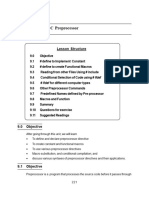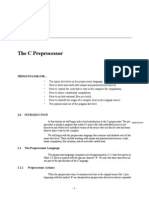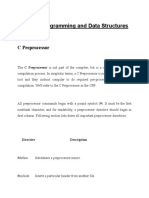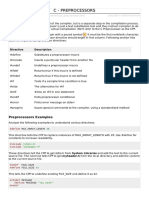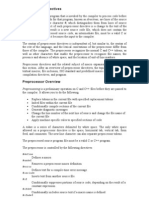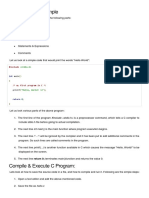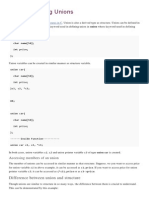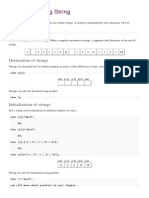C Programming Preprocessor and Macros
Uploaded by
slspaC Programming Preprocessor and Macros
Uploaded by
slspaC Programming Preprocessor and Macros
Preprocessor extends the power of C programming language. Line that beg in with # are called preprocessing
directives.
Use of #include
Let us consider very common preprocessing directive as below:
#include <stdio.h>
Here, "stdio.h" is a header file and the preprocessor replace the above line with the contents of header file.
Use of #define
Preprocessing directive #define has two forms. The first form is:
#define identifier token_string
token_string part is optional but, are used almost every time in program.
Example of #define
#define c 299792458 /*speed of light in m/s */
The token string in above line 2299792458 is replaced in every occurance of symbolic constant c.
C Program to find area of a cricle. [Area of circle=r 2]
#include <stdio.h>
#define PI 3.1415
int main(){
int radius;
float area;
printf("Enter the radius: ");
scanf("%d",&radius);
area=PI*radius*radius;
printf("Area=%.2f",area);
return 0;
}
Output
Enter the radius: 3
Area=28.27
Syntactic Sugar
Syntactic sugar is the alteration of programming syntax according to the will of programmer. For example:
#define LT <
Every time the program encounters LT, it will be replaced by <.
Second form of preprocessing directive with #define is:
Macros with argument
Preprocessing directive #define can be used to write macro definitions with parameters as well in the form
below:
#define identifier(identifier 1,.....identifier n) token_string
Again, the token string is optional but, are used in almost every case. Le t us consider an example of macro
definition with argument.
#define area(r) (3.1415*(r)*(r))
Here, the argument passed is r. Every time the program encounters area(argument) , it will be replace
by (3.1415*(argument)*(argument)) . Suppose, we passed (r1+5) as argument then, it expands as below:
area(r1+5) expands to (3.1415*(r1+5)*(r1+5))
C Program to find area of a circle, passing arguments to macros. [Area of circle=r 2 ]
#include <stdio.h>
#define PI 3.1415
#define area(r) (PI*(r)*(r))
int main(){
int radius;
float area;
printf("Enter the radius: ");
scanf("%d",&radius);
area=area(radius);
printf("Area=%.2f",area);
return 0;
}
Predefined Macros in C language
Predefined macro
Value
__DATE__
String containing the current date
__FILE__
String containing the file name
__LINE__
Integer representing the current line number
__STDC__
If follows ANSI standard C, then value is a nonzero
integer
__TIME__
String containing the current date.
How to use predefined Macros?
C Program to find the current time
#include <stdio.h>
int main(){
printf("Current time: %s",__TIME__); //calculate the current time
}
Output
Current time: 19:54:39
You might also like
- Chapter: Programming and Data Structures: C PreprocessorNo ratings yetChapter: Programming and Data Structures: C Preprocessor12 pages
- Preprocessors The C Preprocessor Is Not Part of THNo ratings yetPreprocessors The C Preprocessor Is Not Part of TH5 pages
- Unit 4 Preprocessor Directives: 1 What Is Pre-Processor?100% (2)Unit 4 Preprocessor Directives: 1 What Is Pre-Processor?6 pages
- Unit-5(Part-4)(Preprocessor Directive and Command Line Arguments)No ratings yetUnit-5(Part-4)(Preprocessor Directive and Command Line Arguments)9 pages
- MK @MSITStore C Program Files C-Free 5 Help CLib - CHM CPP100% (1)MK @MSITStore C Program Files C-Free 5 Help CLib - CHM CPP4 pages
- Preprocessor Directives in C ProgrammingNo ratings yetPreprocessor Directives in C Programming7 pages
- 7-Preprocessors-14-03-2022 (14-Mar-2022) Material - I - 14-03-2022 - PreprocessorsNo ratings yet7-Preprocessors-14-03-2022 (14-Mar-2022) Material - I - 14-03-2022 - Preprocessors31 pages
- String Manipulations in C Programming Using Library FunctionsNo ratings yetString Manipulations in C Programming Using Library Functions1 page
- C Programming Break and Continue StatementNo ratings yetC Programming Break and Continue Statement4 pages





